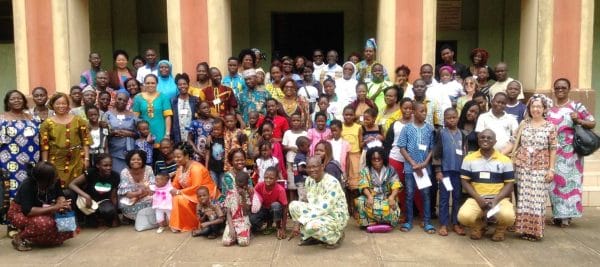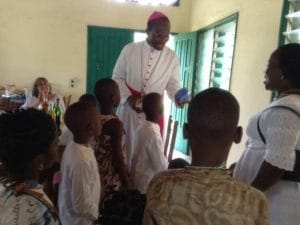 Ghana, Togo and Benin are situated alongside one another in a vertical line along the Gulf of Guinea. They are well known for their rich variety of landscape and for their ancient culture and historical ruins. In Ghana, for example, there are many colonial style buildings which remain from the time of slavery, in Bazar in Togo there are many clay settlements and in Abomey, Benin, there are the remains of the royal palace which is now a museum. The Mariapolis for this area was held in Benin. The report of this event prepared by Bernadette, Mariluz and Flora states, “Most of the people from Benin and Togo arrived wearing clothes made from the same cloth. This is what usually happens at big celebrations but what was striking was that the cloth was white.”
Ghana, Togo and Benin are situated alongside one another in a vertical line along the Gulf of Guinea. They are well known for their rich variety of landscape and for their ancient culture and historical ruins. In Ghana, for example, there are many colonial style buildings which remain from the time of slavery, in Bazar in Togo there are many clay settlements and in Abomey, Benin, there are the remains of the royal palace which is now a museum. The Mariapolis for this area was held in Benin. The report of this event prepared by Bernadette, Mariluz and Flora states, “Most of the people from Benin and Togo arrived wearing clothes made from the same cloth. This is what usually happens at big celebrations but what was striking was that the cloth was white.”  A warm welcome was given to the Archbishop of Cotonou, Roger Houngbedji, who was taking part in a Focolare gathering for the first time. There were 120 participants in total, including many teenagers and children. The programme included workshops on topics related to the practice of the ideal of unity in everyday life, improving one’s own life and making a positive impact upon society: for example, economy, the relationship between parents and children, affectivity and sexuality, handling stress. “The children played “living in the town” and took on different parts – in the hospital, at the market, on the sports pitch or in the restaurant. The young people spoke openly about the challenges they face. One morning was spent clearing the market place which was littered with empty plastic bags that had been thrown on the ground. The mayor had given permission for this public action which created a sense of beauty and harmony. In the past, slaves used to leave from the town of Ouidah for the ‘new world.’ Having been sold to white people, they crossed the ocean chained up in the hold of a ship. They took their last steps in their native land as they crossed the “point of no return” beyond which they were no longer considered to be human beings but merchandise. “We followed in their footsteps praying as we walked along this ‘way of the cross.’ At the ‘point’ we asked for an end to all forms of slavery and thanked God for the missionaries who later brought Christianity to Africa.”
A warm welcome was given to the Archbishop of Cotonou, Roger Houngbedji, who was taking part in a Focolare gathering for the first time. There were 120 participants in total, including many teenagers and children. The programme included workshops on topics related to the practice of the ideal of unity in everyday life, improving one’s own life and making a positive impact upon society: for example, economy, the relationship between parents and children, affectivity and sexuality, handling stress. “The children played “living in the town” and took on different parts – in the hospital, at the market, on the sports pitch or in the restaurant. The young people spoke openly about the challenges they face. One morning was spent clearing the market place which was littered with empty plastic bags that had been thrown on the ground. The mayor had given permission for this public action which created a sense of beauty and harmony. In the past, slaves used to leave from the town of Ouidah for the ‘new world.’ Having been sold to white people, they crossed the ocean chained up in the hold of a ship. They took their last steps in their native land as they crossed the “point of no return” beyond which they were no longer considered to be human beings but merchandise. “We followed in their footsteps praying as we walked along this ‘way of the cross.’ At the ‘point’ we asked for an end to all forms of slavery and thanked God for the missionaries who later brought Christianity to Africa.”  Moving west to Senegal, the Mariapolis was held in Ngazobil, 110 kilometres from the capital, Dakar. 94 people took part from Senegal, Mali and Burkina Faso: these countries lie close to the Sahel region in an area where risks to personal security are high. “It was not easy to travel to the Mariapolis. It took two days’ coach journey just to arrive for people from Mali and three days from Burkina Faso: it was really tiring for the very small children and for the older people many of whom use crutches to walk.” Aurora wrote, “The fact that people undertook such an uncomfortable journey in such difficult circumstances in order to reach a Mariapolis they called an ‘oasis’ or ‘town of peace’ is a witness to the fact that there is an enormous thirst for God in our people.” It was a beautiful experience of communion. Jean Noel Diof, emeritus bishop, attended as did Nana, a young Muslim from Burkina Faso. At the end, Nana said, “As the only Muslim, these four days have strengthened my faith and have helped me to appreciate another religion.” A Christian participant from Senegal said, “I have understood how to be with people from other Churches and with people of the Muslim faith.”
Moving west to Senegal, the Mariapolis was held in Ngazobil, 110 kilometres from the capital, Dakar. 94 people took part from Senegal, Mali and Burkina Faso: these countries lie close to the Sahel region in an area where risks to personal security are high. “It was not easy to travel to the Mariapolis. It took two days’ coach journey just to arrive for people from Mali and three days from Burkina Faso: it was really tiring for the very small children and for the older people many of whom use crutches to walk.” Aurora wrote, “The fact that people undertook such an uncomfortable journey in such difficult circumstances in order to reach a Mariapolis they called an ‘oasis’ or ‘town of peace’ is a witness to the fact that there is an enormous thirst for God in our people.” It was a beautiful experience of communion. Jean Noel Diof, emeritus bishop, attended as did Nana, a young Muslim from Burkina Faso. At the end, Nana said, “As the only Muslim, these four days have strengthened my faith and have helped me to appreciate another religion.” A Christian participant from Senegal said, “I have understood how to be with people from other Churches and with people of the Muslim faith.”  A Mariapolis also took place in Zambia, a central-southern area of the continent. Zambia has often been called the “real jewel of Africa” because of its landscape, full of features of outstanding natural beauty such as the famous Victoria Falls. The theme of the Mariapolis was “Mary, mother of unity.” Celestino wrote, “This theme was perfect because of the many divisions in our society at the moment. Such a diversity of people took part and their comments at the end reveal the importance of this meeting.” “A time for reflection and change.” “I have learnt what it means to love, to care for other people and to forgive.” “I have met brothers and sisters from my own country.”
A Mariapolis also took place in Zambia, a central-southern area of the continent. Zambia has often been called the “real jewel of Africa” because of its landscape, full of features of outstanding natural beauty such as the famous Victoria Falls. The theme of the Mariapolis was “Mary, mother of unity.” Celestino wrote, “This theme was perfect because of the many divisions in our society at the moment. Such a diversity of people took part and their comments at the end reveal the importance of this meeting.” “A time for reflection and change.” “I have learnt what it means to love, to care for other people and to forgive.” “I have met brothers and sisters from my own country.”
Put love into practice
Put love into practice




0 Comments